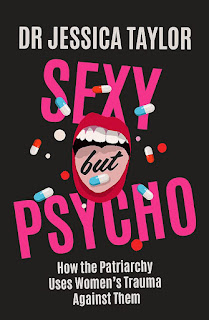Cheery December Reading
It's nothing but fun around here, as you can see by these very cheery selections. Maybe I should try to read heartwarming Christmas tales for a bit?
Sexy But Psycho: How the Patriarchy Uses Women's Trauma Against Them, by Dr Jessica Taylor: This is a UK book, and focuses on UK practices, though it's still relevant to the US. But just so you know, she uses a lot of NHS terminology that I didn't understand at first, such as sectioning, which seems to be holding a patient for psychiatric reasons without their consent. Anyway...
Taylor's theme is that she has seen way too many women shoved into psychiatric diagnoses and medication because they were upset about the abuse that they had suffered. Say you get a teen girl who has been through some horrific abuse, and instead of receiving therapy and advocacy, she is told that she is making a lot of it up and has BPD. Her distress is interpreted as mental illness instead of a normal person's reaction to terrible things happening to them. Taylor presents many stories and a certain amount of data to back up what she's saying (for example, that somehow teen girls and women are sectioned far more often than young men are), but much of it is unquantifiable, either because the data isn't collected in the first place or because of privacy laws. The solution -- to use a trauma-informed approach that takes people's experiences into account and is sympathetic to their distress.
This is a fascinating book that will give readers a whole lot to think about. I think she is correct about a lot of things. We do have a cultural narrative that women are unstable, and that there are a lot of 'sexy but psycho' women around. I also think she takes it too far; Taylor goes so far as to imply that there isn't mental illness; there is just trauma or oppression and people's reaction to it, and the establishment's oppression of the oppressed. I don't buy it. Mental illness is real and a terrible burden for many people, and Taylor undermines her thesis with that nonsense, which is too bad because there is a lot here to pay close attention to. So -- read it, but with reservations.
Diaries of War: Two Visual Accounts from Ukraine and Russia, by Nora Krug: when Russia invaded Ukraine again in February of 2022, German graphic artist Nora Krug reached out to two people, asking them to commit to weekly updates. K is a Ukrainian journalist, a wife and mother to two; D is a Russian artist, husband and father to two. Every week, Krug would send them questions, and they would answer with short descriptions of their lives and their thoughts. These weekly texts are placed across from each other on the page in 52 spreads that cover the first year of this war.
D starts in Kyiv, moves to Lviv, sends her children and mother to Denmark, and travels constantly -- between the war zones and her children, between Kyiv and Lviv, only occasionally seeing her husband, who is also a journalist. Her friends are scattered, killed, or captured and tortured. She meditates on what this war is doing to everyone she knows, whether her children will have to grow up in Denmark. Having grown up partially in Russia, she mourns the friendships she once had with people who now support the invasion and wonders how anyone will move forward.
K lives in St. Petersburg, and is appalled by the invasion, but also doesn't dare to protest aloud; everyone can see what happens to anyone who dares to dissent. Instead he thinks about emigrating, and travels to Latvia, Turkey, and finally France, looking for a way to get his family out and, at the same time, agonizing over whether he can stand to leave his beloved city. He talks about his shame at being Russian, and doubts whether he was ever able to make a difference through his art, as he tried to do. Even in France, he is afraid to speak publicly about his opposition to the war, because his family is still vulnerable.
Nora Krug's drawing style is not my favorite, but the content makes it a crucial read anyway. Definitely recommended.







Comments
Post a Comment
I'd love to know what you think, so please comment!